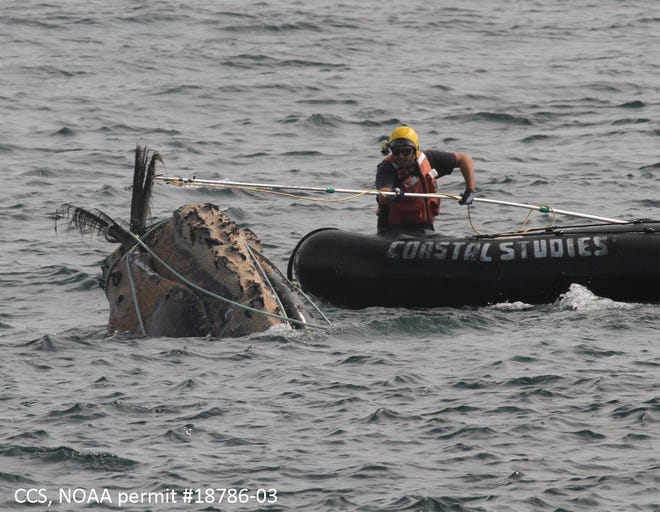Conservation groups: NOAA didn't go far enough in protecting right whales in latest plan
Conservation groups concerned the North Atlantic right whale is headed toward extinction are not happy with the federal protection plan announced Thursday, saying it does not go far enough to reduce the threat from fisheries to levels where scientists think the whale population can recover.
The National Oceanic and Atmospheric Administration had until Monday to comply with Judge James Boasberg’s ruling last August that they fully assess the impact of the lobster fishery on right whales — and come up with a plan to protect the world’s most endangered great whale.
Urgent:Path to extinction continues for North Atlantic right whales
NOAA released a biological opinion as required under the federal Endangered Species Act for 10 fisheries, including the lobster fishery, that found none of them were “likely to jeopardize the continued existence of any ESA (Endangered Species Act)-listed species."

This finding included a phased-in approach over the next decade for the lobster industry, whose lines connecting pots on the ocean floor to marker buoys on the surface are considered the primary source of right whale entanglements.
Conservation groups say that with right whale population numbers continuing to decline, NOAA needs to take drastic measures to save the species that is numbered at approximately 350 whales, according to the New England Aquarium. A recent study by the Aquarium’s Anderson Cabot Center for Ocean Life found that known deaths represented just 36% of the total number dead from human causes each year. Anderson Center researchers found that 83% of right whales identified in their right whale catalog had been entangled once or multiple times.
The Humane Society of the United States was one of the plaintiffs in the lawsuit presided over by Boasberg. The society’s marine issues field director Sharon Young said Boasberg’s ruling required that NOAA come up with a plan that reduces serious injuries/mortalities to below one animal per year.
But the agency’s outline in the conservation framework that accompanied the biological opinion laid out steps that did not reach that number until 2030.
“It’s been frustrating. They have a legal obligation; it’s very clear, and the court made it clear to them that they had an obligation and they had to meet it,” Young said. But she said NOAA’s effort fell far short of what was required under the law.
“Not only did you not hit it out of the ballpark, you didn’t make it off the base and the ball landed at your feet. It’s disappointing to say the least; it’s tragic really,” she said.
Jane Davenport, a senior attorney for Defenders of Wildlife, another plaintiff in the lawsuit, said her organization was analyzing NOAA’s nearly 600-page biological opinion and wouldn’t comment other than to say that they were considering their options.
'Some flexibility for the fishing industry'
In justifying that delay, NOAA said it was evidence of its “commitment to implement measures that are necessary for the recovery of right whales, while providing … some flexibility for the fishing industry.”
The biological opinion included a conservation framework that called for a 60% reduction in right whale mortalities and serious injuries to 2.69 animals per year this year, and an additional 60% reduction in 2025 to reach 1.04 right whales per year and an 87% reduction in 2030 to reach less than two-tenths of a right whale — or less than one right whale killed by entanglement every five years.
In an email, NOAA spokesperson Allison Ferreira wrote that allowing fisheries in federal waters under the phased-in approach, including the lobster fishery, “will not result in an appreciable reduction in the likelihood of survival and recovery of North Atlantic right whales” when compared with shutting down all fisheries that could entangle whales.
Included in the biological opinion is a study released in January by NOAA researcher Daniel Linden that found even a 100% reduction in entanglements by U.S. pot and trap fisheries would still result in a greater than 50% chance of the right whale population continuing to decline. Deaths from Canadian fisheries as well as ship strikes would also have to be curtailed.
Ferreira said reevaluation of the plan would occur following lethal incidents in federal waters, and that evaluation of the effectiveness of the measures is mandated for 2023 and again in 2025. The actual plan that would implement measures such as reductions in the number of buoy lines, gear markings, and lower breaking strength ropes and devices, is expected in early September.
Helping whales: Old fishing gear to be removed from Cape Cod Bay
“By their plan, they will be allowing an excessive number of entanglements causing death to right whales for the next decade,” said Gib Brogan, senior campaign manager at Oceana. “It’s problematic; it’s dangerous for the whales. Instead of an honest assessment of what the fishery will look like this year, they looked far off into the distance, and that’s not what they need to be doing.”
Arthur “Sooky” Sawyer, president of the Massachusetts Lobstermen’s Association, said the measures to get a 60% reduction in right whale mortalities this year combined with another 60% reduction in 2023would be hard for the lobster industry to survive.
Massachusetts just implemented sweeping measures to close large areas of state waters and enact gear changes to make it easier for right whales to escape entanglement. That’s ahead of a case in U.S. District Court in Boston next month — in which animal rights activist Richard "Max" Strahan seeks to revoke all lobster licenses — that Sawyer said would have a greater impact on state lobster fishermen than the federal rules.
“If (Strahan) gets any type of victory in Massachusetts, he’ll do the same with Maine,” Sawyer said.

No comments:
Post a Comment
Note: Only a member of this blog may post a comment.